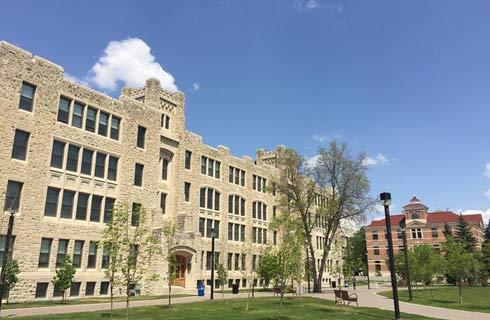财经专业文学士(荣誉学位)
Bachelor of Arts in Finance and Economics

学历文凭
Bachelor Degree

专业院系
Algoma University

开学时间

课程时长

课程学费

国际学生入学条件
International applications are individually assessed on country-specific criteria.
In general, we are looking for 5-6 traditional academic courses in the final year of senior secondary including English. Other course requirements will apply for certain programs.
A minimum average of 65%/70% or country-specific equivalent
Proof of language proficiency for non-native English speakers.
The IB Diploma with a minimum of 26 points is accepted for admission.
Candidates with 28 points or higher in the IB Diploma qualify for scholarship consideration.
Upon attainment of 28 points in the IB diploma, a minimum grade of 5 in either Standard (SL) or Higher (HL) Level courses is required for consideration of credit transfer.
IDP—雅思考试联合主办方

雅思考试总分
6.0
- 雅思总分:6
- 托福网考总分:79
- 托福笔试总分:550
- 其他语言考试:Duolingo - Overall 110 (including no individual band below 90)
CRICOS代码:
申请截止日期: 请与IDP联系 以获取详细信息。
课程简介
AlgomaU’的四年制财经专业文学士学位是一个独特的课程
By combining both the finance and economics programs, students earn a holistic degree, which emphasizes the financial analysis and management side of economics and business administration, and therefore equips students with advanced skills in financial analysis, management, and forecasting skills. Algoma U’s four-year Bachelor of Arts in Finance and Economics is a unique program, different from other university programs found across the province. Our faculty is committed to a hands-on learning experience where students are able to establish a personal relationship with their professors. This fosters a very intimate and interactive learning environment.Our program concentrates on theory, applications, and explorations in current and policy-related issues at the regional, national, and international level. Students will study the roles of government, business, and financial institutions, as well as individuals as they interact to determine the distribution of a country’s total range of goods and services. Courses cover a wide array of topic areas, including environmental economic policies, microeconomics, urban economics, international trade, public finance, international finance, elementary statistical methods for economists, among others.
By combining both the finance and economics programs, students earn a holistic degree, which emphasizes the financial analysis and management side of economics and business administration, and therefore equips students with advanced skills in financial analysis, management, and forecasting skills. Algoma U’s four-year Bachelor of Arts in Finance and Economics is a unique program, different from other university programs found across the province. Our faculty is committed to a hands-on learning experience where students are able to establish a personal relationship with their professors. This fosters a very intimate and interactive learning environment.Our program concentrates on theory, applications, and explorations in current and policy-related issues at the regional, national, and international level. Students will study the roles of government, business, and financial institutions, as well as individuals as they interact to determine the distribution of a country’s total range of goods and services. Courses cover a wide array of topic areas, including environmental economic policies, microeconomics, urban economics, international trade, public finance, international finance, elementary statistical methods for economists, among others.
相关申请
 预科
预科 奖学金
奖学金 实习机会
实习机会 在校学习
在校学习 跨境学习
跨境学习 校园授课-线上开始
校园授课-线上开始 在线/远程学习
在线/远程学习
开学时间&学费
学费信息仅供参考,请与IDP联系以获取详细信息
| 开学时间 | 时长 | 学费 | 地点 |
|---|
本校相关课程

英语作为第二语言
学历文凭
English Language
开学日期
课程费用总额


社会学文学士
学历文凭
Bachelor Degree
开学日期
课程费用总额


社会学文学士(荣誉学位)
学历文凭
Bachelor Degree
开学日期
课程费用总额


社会工作学士(荣誉学位)
学历文凭
Bachelor Degree
开学日期
课程费用总额


心理学(荣誉)学士学位
学历文凭
Bachelor Degree
开学日期
课程费用总额


心理学文学士(荣誉学位)
学历文凭
Bachelor Degree
开学日期
课程费用总额

其他相关课程

认知分析会计学理学硕士
 西蒙菲莎大学
西蒙菲莎大学学历文凭
Masters Degree
开学日期
课程费用总额


金融学学士
 鲍尔州立大学位
鲍尔州立大学位学历文凭
Bachelor Degree
开学日期
课程费用总额


商业金融理学学士
 普渡大学西北校区
普渡大学西北校区学历文凭
Bachelor Degree
开学日期
课程费用总额


Bachelor of Science in Economics - Finance
 宾夕法尼亚大学
宾夕法尼亚大学泰晤士高等教育世界大学排名:14
学历文凭
Bachelor Degree
开学日期
课程费用总额


税务和财务规划硕士
 威得恩大学-国际学习中心(StudyGroup)
威得恩大学-国际学习中心(StudyGroup)学历文凭
Masters Degree
开学日期
课程费用总额


国际工商管理学士-会计(荣誉学位)
 约克大学
约克大学学历文凭
Bachelor Degree with Honours
开学日期
课程费用总额











